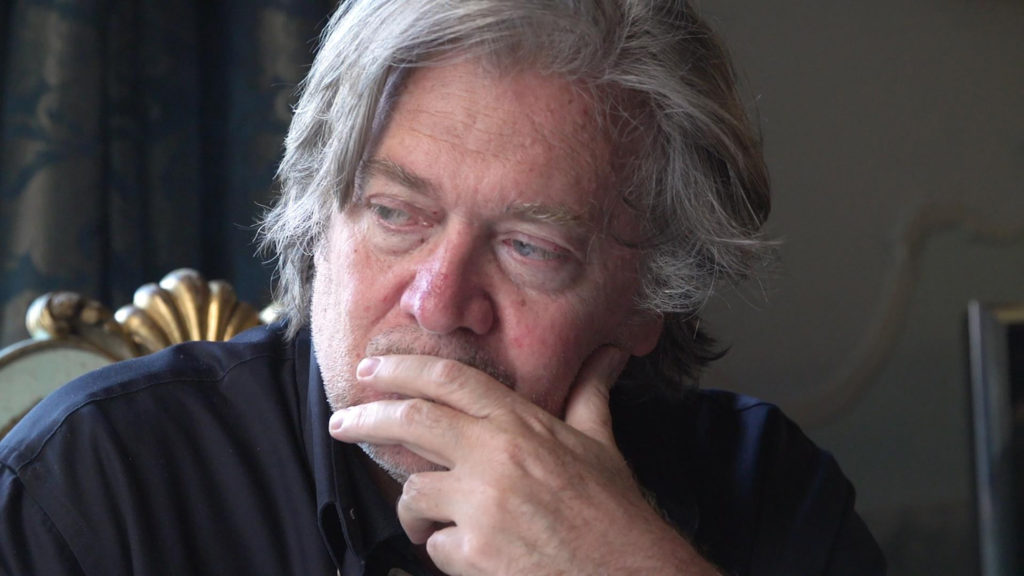Alison Klayman’s directorial debut, “Ai Weiwei: Never Sorry,” won a U.S. Documentary Special Jury Prize for Spirit of Defiance at Sundance Film Festival and was shortlisted for the Academy Award. Her other films include “The 100 Years Show” and “Take Your Pills.” She executive produced the award-winning documentaries “Hooligan Sparrow” and “On Her Shoulders.”
“The Brink” will premiere at the 2019 Sundance Film Festival London on June 1.
W&H: Describe the film for us in your own words.
AK: “The Brink” is an all-vérité feature documentary that follows Steve Bannon for 13 months from his White House departure to the 2018 midterm elections, offering viewers a gripping and honest look behind the curtain of the far-right and the mainstream of the Republican party.
W&H: What drew you to this story?
AK: I was drawn to the unique opportunity to go behind enemy lines and see with my own eyes — and camera and microphones — what the right was going to do next, what their tactics were, who supported them, etc.
It was so unique to have a figure like Bannon agree to a high level of access for a filmmaker who did not share his worldview. I saw this as a contribution to history as well as this current moment.
W&H: What do you want people to think about when they are leaving the theater?
AK: Audiences are going to have different takeaways depending on what they bring to the film, but what I want people to be thinking about and discussing is the banality of evil, how Bannon is funded by millionaires and billionaires and what that means, how the media should be covering Bannon and far-right nationalism, and how those of us who oppose them could be most effective and win at the ballot box.
W&H: What was the biggest challenge in making the film?
AK: Everything about this project was challenging, but ultimately the biggest challenge was how to responsibly handle this material and subject. My daily mantra was “Let him be underestimating me, and let me never underestimate him.”
Bannon is an opportunistic, self-proclaimed propagandist who admits he’s always looking for ways to use the mainstream media to his advantage. I needed a lot of patience in order to capture the footage that would go beyond the story he wanted me to tell, and to find a sophisticated storytelling technique that would, without a narrator or talking heads, provide context and expose the tactics, lies, and hypocrisies.
I relied on devices like humor, repetition, and juxtaposition to communicate the film’s point of view.
W&H: How did you get your film funded? Share some insights into how you got the film made.
AK: The film was fully funded by our distributor Magnolia Pictures and RYOT Films. We brought the project to Magnolia right at the beginning when we started conversations about access with Bannon.
W&H: What inspired you to become a filmmaker?
AK: I loved TV and movies growing up, and I started out working in radio in college. Although I still love radio, I realized it was something that people engaged with while they were doing something else, and I began to see film as the next step in storytelling — something that could really command the audience’s full sensory attention.
W&H: What’s the best and worst advice you’ve received?
AK: I recently saw advice for creatives that I’m trying hard to follow myself: Allow yourself time to rest, recover, and explore. Not everything you do needs to turn into a film, and that’s OK!
W&H: What advice do you have for other female directors?
AK: On this film, I didn’t mind being underestimated by my subject. When you can, try to turn disadvantages into an advantage.
W&H: Name your favorite woman-directed film and why.
AK: I think the woman-directed film I’ve seen the most times is Amy Heckerling’s “Clueless.”
W&H: It’s been over a year since the reckoning in Hollywood and the global film industry began. What differences have you noticed since the #MeToo and #TimesUp movements launched?
AK: Speaking from my vantage point as an independent director, I have been fortunate to run a few sets recently that were either half or majority women, and I received amazing feedback from my collaborators about the experience of working on a woman-led set.
I think we should always be working with crews that reflect the world we live in, and push for inclusion in all forms.







